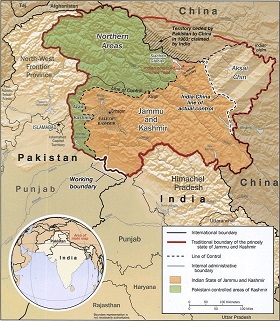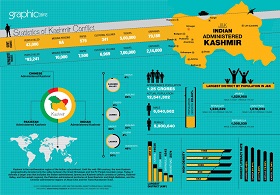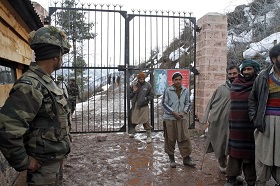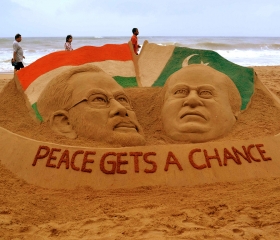Kashmir: A Volcano That’s About to Erupt?
Kashmiri girls pass by an Indian security
personnel standing on guard on a deserted
street during restrictions following a youth's
killing in Srinagar May 1, 2014. Police opened
fire in Indian Kashmir on Wednesday killing one
man as small groups opposed to Indian rule and
the holding of national elections in the territory
threw stones and attacked government vehicles.
In
Login if you are already registered
(no votes) |
(0 votes) |
Doctor of History, Deputy Director of the Institute of Oriental Studies, Russian Academy of Sciences
The meeting between the foreign ministers of India and Pakistan that was scheduled for 25 August 2014 in Islamabad has been postponed at the request of New Delhi because of the situation around Kashmir. So far there is no new date for the consultations. The Kashmir problem may become aggravated again under the influence of the changes taking place in India in connection with the change of government, and for other reasons. The new Indian cabinet’s policy, as well as that of Pakistan’s ruling circles, might push events in a positive direction, but the forces that have an interest in “rocking the boat” are maintaining their stance. Either way, the influence of global players, especially the USA and Europe, is most likely to wane.
The meeting between the foreign ministers of India and Pakistan that was scheduled for 25 August 2014 in Islamabad has been postponed at the request of New Delhi because of the situation around Kashmir. So far there is no new date for the consultations. The Kashmir problem may become aggravated again under the influence of the changes taking place in India in connection with the change of government, and for other reasons. The new Indian cabinet’s policy, as well as that of Pakistan’s ruling circles, might push events in a positive direction, but the forces that have an interest in “rocking the boat” are maintaining their stance. Either way, the influence of global players, especially the USA and Europe, is most likely to wane.
Conflict in the mountains
The Kashmir conflict is probably the longest on record in the modern world. It started in the autumn of 1947 and preceded the Israeli-Palestinian conflict, if that is dated from the formation of Israel in May 1948. The similarity between them is that they were directly related to Britain, which was pulling out of territories under its control after the Second World War. Moreover, in both cases the main participants in the conflict, especially those on the receiving end of the conflict, were Muslims. They constituted the absolute majority of the population of Jammu and Kashmir, which like the other Indian Princely States had not been under direct British rule. Kashmir was ruled by Maharaja Hari Singh. He wanted to achieve independent status for the princely state, but under the rules which Great Britain had drawn up for its withdrawal from India only non-Muslim India and Muslim Pakistan were recognised as independent dominions in August 1947. Kashmir obtained freedom, but not recognition. During the bloody clashes that followed the partitioning of India, Pashtun tribal forces supported by Pakistan invaded Kashmiri territory. The state’s ruler was forced to agree to Indian annexation. Part of the former princely state, however, seceded and came under the protection of Pakistan. The dividing line that was established as a result in 1948 became the scene of battles between regular military units of the two new states. The First Kashmir War ended with a treaty signed in June 1949, but there was still no agreement on the fate of the princely state. The involvement of international intermediaries in the form of the UN Commission for India and Pakistan and the commissioner of that organisation for a plebiscite in the former princely state did not help either.
In 1965 Pakistan started a war with India over Kashmir, but achieved nothing despite having better weapons, obtained from the USA, and the support of Beijing. Moscow acted as an intermediary and helped the two sides to sign a peace declaration in Tashkent. While the third Indo-Pakistan war in 1971 was not fought over Kashmir, Pakistan suffered total defeat in it and lost its eastern “wing”, where the new state of Bangladesh emerged. It also suffered losses in Kashmir, losing part of the territory it controlled. In addition, Pakistan agreed to resolve the Kashmir dispute without intermediaries, i.e. without UN involvement, which was very important for India, which did not, and does not, want third parties to intervene in the region’s affairs.
Between 1989 and 2002 a kind of “intifada” was waged in the Indian part of Kashmir – an armed uprising against the authorities which was directly and indirectly supported by Pakistan. An armed conflict broke out in 1999 on the northern part of the Line of Control, in the Kargil sector: it was started by Pakistan but ended in defeat. In 2001–2002 the two neighbours, which by that time had acquired nuclear weapons, were close to all-out conflict, but it was averted. A process of improving relations and seeking ways of settling the Kashmir conflict began in 2003. The Kashmir “volcano” remains dormant today, although it has never fully died down, and indeed in the last two years it has increasingly shown signs of life.
The Bharatiya Janata Party’s victory in the 2014 elections and Kashmir
The Indian nationalist party and its charismatic leader Narendra Modi won a convincing victory in the Indian general elections of spring 2014. He had led the government in the western state of Gujarat for more than ten years, and the state had achieved impressive success in the economy and in the social sphere, with the highest rate of growth in per-capita income in India [1].[1] At the same time, in 2002 it was the scene of clashes between Hindus and Muslims. More than a thousand people died, mainly Muslims. The commission of enquiry that investigated the causes of the event found Narendra Modi not guilty “for lack of evidence”, but he is still dogged by suspicion.
The Kashmir “volcano” remains dormant today, although it has never fully died down, and indeed in the last two years it has increasingly shown signs of life.
Moderate forces have long held the leading position among the supporters and leadership of the Bharatiya Janata Party (the Indian People’s Party, BJP). These include Atal Bihari Vajpayee, who was prime minister of India from 1998 to 2004. The choice of Narendra Modi’s as leader of the election campaign and candidate for the post of prime minister for the BJP was initially not unanimous. However, once they were convinced of his popularity, even the party’s moderate leaders came out in support of him. During the election campaign he was in third place on domestic policy issues, but he invariably emphasised his respect for the views of Vajpayee on difficult issues such as that of Kashmir.
Article 370 and the citizenship dispute
This is about the special status of the state of Jammu and Kashmir (J&K), enshrined in article 370 of the Indian constitution. According to this article any act passed by the central parliament shall apply to the state only when it has been agreed by the state’s legislative assembly (provided the state cedes authority to the centre in matters of defence, foreign relations and communications). One very important consequence of this article is that it recognises the special status of a citizen of the state. This stems from the period of princely rule, when an act of 1927 ruled that only its indigenous residents were recognised as citizens of the princely state and entitled to own property. This was also enshrined in the legislation of Jammu and Kashmir after it had turned from a princely state into a state (State Subject Law). The isolation that results from this prevents the indigenous population being “diluted” by people moving in from other parts of India. The lack of such constitutional restrictions in other countries has led, for example, to the mass migration of Han Chinese people into the autonomous regions of Tibet and Xinjiang, while in Israel it has led to areas that are traditionally Arab being turned into Jewish areas.
Kashmir could again explode and become yet another front in the fight for Islamist goals. At the same time we must not lose sight of the fact that many leaders of the former “intifada” are alive and have even remained in their previous posts.
The repeal of article 370 was recently made an objective of the BJP, and Narendra Modi was in agreement with this. During a pre-election visit to J&K in December 2013, however, he preferred to put forward a plan according to which the issues of article 370 and the status of the citizen could in time become a subject of discussion. Modi acted with equal care, not dealing directly with the matter of the article, when he became prime minister in May 2014. He paid a short visit to the state twice, in July and August. While individual members of his cabinet were already making statements about the desirability of raising the issue of the article, the premier made only indirect reference to it. He noted in particular that alongside its “positive discrimination” in favour of indigenous residents, article 370 really isolated the state from the rest of India and the outside world, preventing the free movement of capital and people. This was quite a strong argument in the context of Kashmir’s lamentable economic position. J&K belongs to the category of poor Indian states with a low level of literacy and high unemployment, especially among Muslims. The state suffered badly from the September floods in 2014. A significant part of the capital city Srinagar and other populated areas found themselves under water. As of the middle of September the flood had already claimed about 200 lives [2].
The forthcoming elections in the state and the probable change of government
If the BJP wins, the question of article 370 will not only be raised but also resolved. Its repeal will arouse indignation even among the Muslim politicians who advocate unity with India.
The causes of J&K’s difficult socio-economic position are complex and varied. The “closed” nature of the state is one of them, but not the main one. The internal situation in J&K has long been too tense, and the frictions between communities have been too severe. The threat of terrorism means that the state is inundated with Indian army units and security forces, and emergency laws are in force that allow the authorities to maltreat young Muslims [3].
Over the last six years (unlike other states, J&K holds elections once every six years, not every five years) the local government has been formed by a coalition of two parties: the National Conference (NC) and the Indian National Congress (INC). Omar Abdullah, leader of the NC, has been chief minister. Since 2008 the situation in the state has been calmer than before, but dissatisfaction with the socio-economic position resulted in a major defeat for the NC and the INC in the Indian parliamentary election in the spring of 2014. The seats allocated to the state were shared by representatives of the BJP and the local opposition party, the People’s Democratic Party (PDP).
Elections to the state’s legislative assembly will take place in October–November 2014, and the new government will take office in January 2015. The NC is more than likely to lose the election on account of the population’s dissatisfaction with the state of affairs. The local branch of the INC has already announced that it is rejecting an electoral coalition with the NC. The Muslim PDP is unlikely to enter into a pact with the BJP, and if it doesn’t win independently it will form a bloc with the INC. But a BJP victory is not ruled out, if the population heeds the separatists’ call for a boycott of the elections. The separatists – supporters of the viewpoint that the fate of the former princely state is unresolved and that a plebiscite must be held – traditionally refuse to take part in parliamentary elections.
If the BJP wins, the question of article 370 will not only be raised but also resolved. Its repeal will arouse indignation even among the Muslim politicians who advocate unity with India. In response to the desire expressed by a representative of the Indian cabinet to put an end to Kashmir’s special status, Omar Abdullah has stated: either the article remains in the Indian constitution or Kashmir ceases to be part of the country. One of the BJP’s senior leaders reacted with a harsh statement: Kashmir will remain an integral part of India regardless of whether article 370 is preserved or not.
Pakistan’s reaction
Kashmir could again explode and become yet another front in the fight for Islamist goals. At the same time we must not lose sight of the fact that many leaders of the former “intifada” are alive and have even remained in their previous posts.
The repeal of article 370 would be absolutely unacceptable to Pakistan, since it would “close” the question of Kashmir. Elections were held there too on 11 May 2013, with the Pakistan Muslim League coming to power, led by Nawaz Sharif, a big businessman and well-known politician. When Narendra Modi invited all the leaders of South Asia to his inauguration at the end of May 2014, Nawaz Sharif travelled to Delhi after agreeing to the condition that he should not meet the leaders of Kashmiri separatist organisations.
Nawaz Sharif’s desire to achieve an improvement in relations with his economically strong neighbour is not shared by everyone in Pakistan. It is primarily the army that opposes yielding any ground on the Kashmir issues for the sake of expanding trade and economic cooperation with India. It is probably the army that lies behind the wave of anti-government demonstrations that gripped Pakistan in August 2014. Sharif looks very likely to overcome the crisis – the demands of the demonstrators are too unpopular and the reasons they give for demanding the prime minister’s resignation and a re-run of last year’s elections are unconvincing. But he will emerge from the political crisis significantly weakened.
Cancelling the meeting of the two countries’ diplomatic representatives was India’s reaction to the consultations which Pakistan’s High Commissioner (ambassador) held with one of the moderate leaders of the Kashmir separatists from the umbrella organisation called the All Parties Hurriyat Conference. India’s decision was also influenced by the growing tension in Kashmir, the increased frequency of exchanges of fire on the Line of Control (the effective border) [4], the killings of soldiers and other incidents. Mutual accusations and the desire to settle accounts with the enemy create an unfavourable background for talks.
Regional rivalry and a new round of terrorism
Another cause of the worsening in bilateral relations lies in the growing competition between India and Pakistan for influence in Afghanistan. Islamabad is suspicious of India’s strengthening economic position in Afghanistan and the development of Indo-Afghan security cooperation. India in turn does not want to let the Afghan Taliban grow stronger, since it regards them as a pro-Pakistan force.
Afghanistan may again become an arena for civilian strife after the substantial reduction in US troops and the International Security Assistance Force (ISAF), which is expected soon. It is obvious that the extremist-minded Taliban will be very actively involved in this strife and will try to recreate the Islamic emirate that existed in 1996–2001. The support of Al-Qaeda and the example of the Islamic State of Iraq and the Levant organisation make such a scenario quite realistic.
In such conditions Kashmir could again explode and become yet another front in the fight for Islamist goals. At the same time we must not lose sight of the fact that many leaders of the former “intifada” are alive and have even remained in their previous posts. Thus Syed Salahuddin, who has been well known since the 1990s and is president of the United Jihad Council, which operates in Kashmir and is banned by the authorities, made a threatening statement in the summer of 2014 about the intention of the Taliban and other Islamists to focus their attention on Indian targets in Kashmir after the foreign troops leave Afghanistan [5]. The recent statement by the current leader of al-Qaeda, Ayman al-Zawahiri, about creating a branch of this terrorist organisation on the Indian sub-continent, also sounded a serious warning.
Global leaders powerless
In conclusion it is worth repeating that the departure of the main US and NATO forces from Afghanistan leaves the jihadists an open field in which they can act. The area of instability in the long war with terror could easily include Indian Kashmir.
The main international forces undoubtedly have an interest in maintaining political stability and in resolving long-standing disputes. At the same time the “old” global players’ opportunities are limited and have no chance of becoming stronger. India has long and consistently been against foreign mediation, including via the UN. It looks as though the Shanghai Cooperation Organisation (SCO) has somewhat greater potential. The 14th SCO summit, which ended on 12 September 2014 in Dushanbe, adopted a policy of expansion [6]. In the near future India and Pakistan might move from being observer countries to full members of the organisation, for which the fight against terrorism is becoming a main objective. Both countries can count on assistance in this fight from the two biggest regional powers – Russia and China. But it will not be easy for them to provide real help in resolving the Kashmir question.
1. Gujarat’s Per Capita Income Growth Highest // The Times of India, 31.07.2014.
2. Jammu and Kashmir Floods: Struggle for Relief Continues // The Indian Express, 16.09.2014.
3. This concerns the emergency laws passed in 1990 to suppress anti-government demonstrations in Kashmir, primarily the Armed Forces Special Powers Act.
4. Pakistan Provokes Again // India Shia News Agency, 22.08.2014.
5. BBC News, 03.06.2014.
6. RusVesna.su, 13.09.2014.
(no votes) |
(0 votes) |








